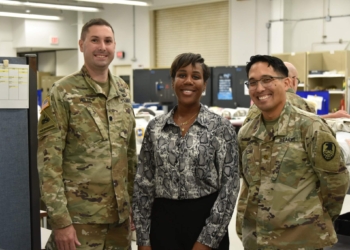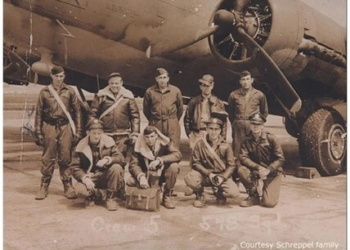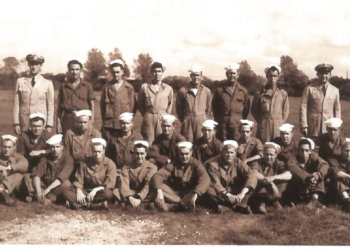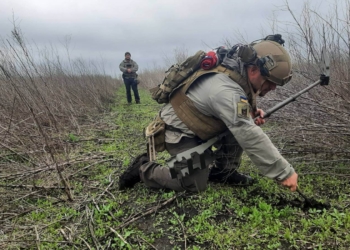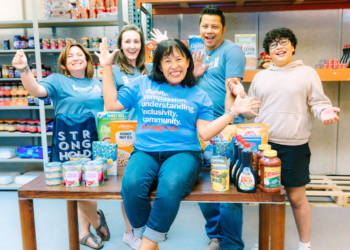If you build it, they will come. For three military couples from Fort Bragg, N.C., their “field of dreams” wasn’t a baseball diamond in Iowa but a six-story coworking space in downtown Fayetteville where veterans, military spouses, active duty soldiers and others in the community could nurture their entrepreneurial dreams.
In an era when many people can work from anywhere and everywhere, coworking office spaces are multiplying in cities across the country. Targeting the military community presents a new spin.
Revolutionary Coworking President and Army spouse Hanah Ehrenreich did not have to live in Fayetteville long to realize a coworking space for “broke nonprofits,” work-from-home military spouses, vetrepreneurs and milpreneurs was the answer to a quietly simmering problem.

Ehrenreich was serving as executive director of Sustainable Sandhills, a small environmental nonprofit in Fayetteville, so she knew firsthand the challenges paying rent and utilities put on a nonprofit’s budget. She was propelled into action after noticing friends working remotely felt trapped in their homes when active duty spouses were deployed or working 12-hour days.
Three years ago, Ehrenreich and her husband, Adam Van Treuren, then an active duty soldier, formed Revolutionary Coworking with two other couples: Army veteran Michael Barbera, now Revolutionary Coworking vice-president, and his spouse, Crystal Wambeke-Barbera, and Army veterans Dalton and Patrice Carter.
Their plan to build a coworking space on the doorsteps of the nation’s largest military installation came together when the Self-Help Ventures Fund, part of North Carolina-based Self-Help Credit Union, offered the fledgling group leased space in Fayetteville’s historic First Citizens Bank building. Self-Help Ventures Fund’s Malcom White said he was impressed by the group’s “compelling narrative” about the need for a coworking space in Fayetteville and their plan to cater to military market segments.
As a nonprofit, Revolutionary Coworking was offered below-market rates for prime real estate, but the capital to get the doors open required a healthy dose of DIY and penny-pinching, with each board member pitching in $300.
“That was enough to get us going,” Ehrenreich recalls. “We had people donate things and we drove to Ikea and loaded Michael’s trailer with desks and four chairs. We just figured we would figure it out.”
They did. Revolutionary Coworking hit its three-year revenue projection in nine months.

Revolutionary Coworking’s cofounders are first to point out their combined talents are greater than the sum of their parts. Together, they bring not only a wealth of entrepreneurial experience but also unique skills: accounting (Wambeke-Barbera), information technology (Van Treuren), economic development (Ehrenreich), cinematography/multimedia consulting (Barbera) and life coaching/public speaking/negotiating (Patrice Carter).
“Our military community always seeks to connect with the local businesses and resources,” Dalton Carter explains. “We wanted RevCo to be a hub where we could bridge the gap between the military and local community while serving the needs of both.”
Because their military target audience mirrored the Revolutionary Coworking board, board members had no doubts about Coworking’s appeal within the Fort Bragg community.
“When people think coworking spaces, they are not necessarily thinking military,” Barbera points out. “But there are a significant number of military spouses [and service members] who need a place to work and don’t want to necessarily work in their homes and don’t want to commit to a long-term real estate lease because of the transient lifestyle.”
Revolutionary Coworking members get more than a place to work, a dedicated desk or an office space. In addition to providing regular networking events and educational programs, Revolutionary Coworking also includes a member-owned, drop-in childcare center onsite.

Army veteran Tiffany Martinez, owner of learning center, praises her partner-member relationship with Revolutionary Coworking.
“When you are working with a group of people who have so much passion, so much love, there’s never a bad day. I don’t know how else to explain it,” Martinez says. “It’s been a blessing.”
Van Treuren, who as a child grew up in Fayetteville, began dedicating his free time to designing the coworking space’s high-tech features after returning from a deployment to Afghanistan in 2016. He says joining the Revolutionary Coworking team taught him a valuable lesson about military life.
“Having an outlet outside of the military meant so much to me,” he says. “I wanted other soldiers to see that. Don’t make military life harder on yourself. Go and find friends outside of it. Find something else to do and give back.”
Military moves and separations have spread Revolutionary Coworking’s cofounders across the country, but their member-owned-and-operated business continues to flourish, with most board members working remotely on its behalf.
“The time commitment from day one to now has significantly decreased,” Wambeke-Barbera notes. “We’re not perfect, but we’re a well-oiled machine.”
Military spouses + remote work
Hiring managers may not yet have fully caught on, but military spouses are an elite remote workforce.
Army spouse Erica McMannes, co-founder and COO of Instant Teams, a remote-talent teambuilding company, has no doubt the military lifestyle prepares spouses to thrive in work-from-home or entrepreneurial businesses.
“By nature, military spouses are self-starters and very autonomous,” McMannes points out. “We’re very multitasking and purpose driven. Those are skills and assets that make remote workers great because naturally we know how to keep ourselves on track.”
When working from home, McMannes recommends finding a designating spot to work, even if it’s a kitchen table. Use virtual calendars, direct messaging apps and project management tools to stay on task. Block scheduling can allow remote workers to plan around school activities or household obligations, she adds.
McMannes says joining a coworking space – if one is available in your community – also can pay dividends.
“We encourage people to go to a coworking space,” she says. “You are going to have the energy of the people working around you and coworking spaces have a really cool vibe.”
Meanwhile, all signs indicate the number of companies offering flexible working policies and work-from-home opportunities will continue to accelerate.
“Awareness of family-needs dynamics and gender equally are driving the concept that people can do their best work from wherever they are,” McMannes says. “Companies understanding that are ahead of the curve.”
Visit Instant Teams to learn more about remote work opportunities for military spouses.
Read comments
















